- Learning time
- 30 minutes
- First play time
- 120 minutes
Deus
Designed by: Sebastian Dujardin
Deus is a civilisation-building game where players jostle for position on the board – actually a modular map; larger with more players – whilst developing a tableau of cards that represent the strength and scope of your civilisation in a number of ways.
You begin the game with several distinct buildings ready to be deployed on the map, and a hand of cards. Turns, mechanically-speaking, are very simple. You can either add a card to your tableau, paying the cost in coins and/or resources (there are five resource types and you begin with a smattering in the coffers, along with a few coins) or make a sacrifice to gather more buildings/resources/money/points and refill your hand of cards.
When you play a card it’s added to your tableau. You can now add the associated building to the map, and then activate all the cards in that column, beginning with the bottom (ie earliest-played) one. The activations revolve around rewards of the game’s five economies: resources, money, buildings, extra cards, points. At the start of the game these activations may feel underwhelming, but each column can have five cards played in it so as the game continues activating a column becomes more rewarding, for instance allowing you to sell resources expensively, buy them cheaply, and sell them again for points as you work your way through the cards you’ve ‘built’. As your buildings expand across the map, they play a key part in the effectiveness of your cards, as many reward you for having buildings in specific spots.
Making a sacrifice means chucking at least one card into the discard pile. Doing so allows you to gather one of the five economies mentioned above – and, if you’ve less than five cards in your hand, replenish it to five (if you’ve triggered a cards reward with your sacrifice, you refill your hand first then draw extra cards on top). The more cards you sacrifice, the greater the rewards from the Gods. So it’s a means of both gathering more stuff and dumping cards you don’t want – most actions on cards are helpful, but some will be more helpful than others depending on the state of the board. Note that some impassable spaces on the board are barbarian camps, loaded with victory points that are awarded when they are surrounded: the player with the most military presence claims the points!
Last but far from least are Temple cards. Expensive to build, but potential game-winners at the end of the game, as they give big points payouts for your civilisation meeting certain criteria: buildings on a forest, say, or a point for every area you’re built in. Your first temple is ‘free’ to build – outside of the resource cost – but any subsequent temples cannot be constructed unless you’ve a matching ‘set’ of cards – ie, one in each column. So whilst building individual columns brings more short-term rewards, the comparatively large points hauls of the temples demand diversity. The game ends either when all temples are built, or all the barbarian villages have been surrounded. Most points wins!
The guru's verdict
-
Take That!
Take That!
There's a bit of it on the map (be the first to a region; regions cannot be shared) and a bit of it in the cards with money and points potentially stolen. But it's a combative seam, and not the overriding experience.
-
Fidget Factor!
Fidget Factor!
Low to moderate, depending on the player count and how many cards they have to peruse!
-
Brain Burn!
Brain Burn!
Buildings can only be placed when you have them, so you need to sacrifice to get them into your supply. Resources are needed to play cards. Money is helpful as a resource stand-in. Cards are always needed, as they're the fuel for your engine. And of course the ultimate goal is points - it's no good building a fantastic production chain where you end the game resource-rich but points-poor. It's a game with relatively light rules, but weightier decisions lie within them.
-
Again Again!
Again Again!
Lots of variety here, and if tactics are dictated by your cards, you can also decide on different broader strategies as well: expansionist, pushing for an early game end? Or consolidating and and building a civilisation of fruitful production before turning your attention to Temple-building?

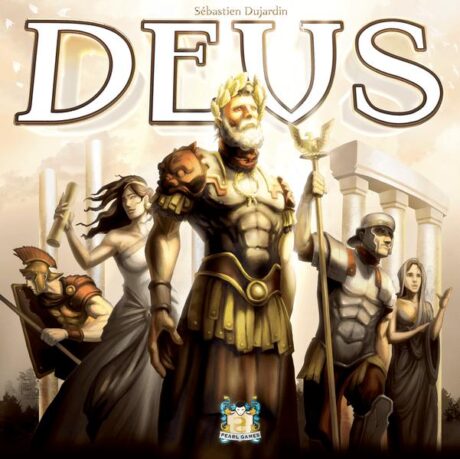



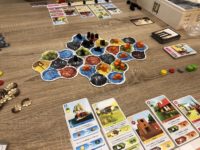




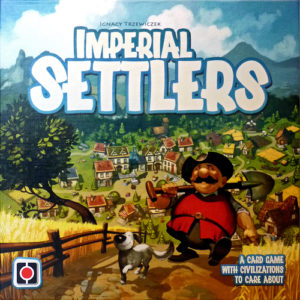

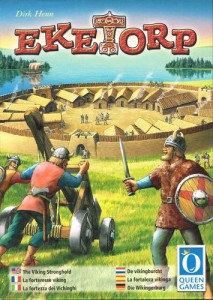

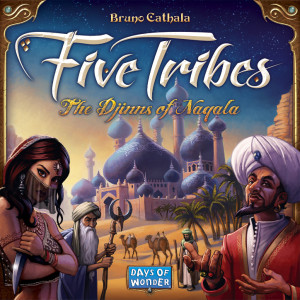
Sam says
At time of writing I've played Deus just the once, and if I wasn't totally blown away by the experience, I can say I was quietly appreciative. It does what it does well - playing a card is very straightforward: pay the cost, activate all cards in the column. Once you've gotten your head around how the sacrifices work the game is very accessible, and combines a battle for control of a reasonably tight map with a lot of variety in the cards and the possibilities they offer in how they combine - what's often referred to as engine-building. Though chess-players may balk at it, I like also how Deus is not a game of perfect information: you don't know what cards your opponent has, nor they you. There's some luck in the card draw, for sure, but not so much that it defined the experience for me. And I really like the simple set-up-and-play: despite the numerous cards, they're all shuffled into a single deck and off you go. Too thinky to be a fast-flowing family frolic, but not so thinky that it feels a grind.